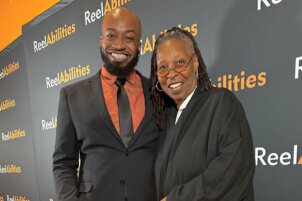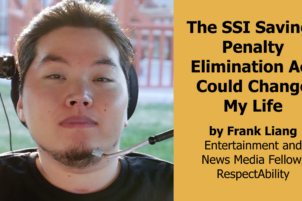Six million students with disabilities and 22 million working age adults with disabilities in America deserve chance to succeed by receiving education and jobs they need to be independent
Washington, D.C., June 21 – As President Donald Trump is expected to announce his desire to merge the U.S. Departments of Education and Labor, RespectAbility urges caution.
“Reorganizing agencies is risky, ” RespectAbility’s President Jennifer Laszlo Mizrahi said. “Clearly we need better outcomes and it is worth exploring change. But creating a better future depends on making sure everyone understands the scale of the problem facing people with disabilities as well.”
There are six million students with disabilities in America’s public schools and more than 20 million working-age adults with disabilities in the U.S who are eager to work.
Employment Opportunities for People with Disabilities
More than 340,000 people with disabilities joined the American workforce last year. As noted by the President’s Council of Economic Advisors, “no group has felt the benefits of accelerated economic growth more than Americans with a disability.”
Critical to that growth has been the transformation of our nation’s workforce system started under the Workforce Innovation and Opportunity Act (WIOA). This paradigm shift has enabled Department of Labor funded programs to provide thousands of people with disabilities with new skills, new opportunities and new jobs. According to a review of relevant DOL data by RespectAbility, job seekers with disabilities now account for fully 10 percent of job seekers being served under WIOA. Opportunities may be put at risk if a bureaucratic restructuring were to take place.
Companies including JP Morgan Chase, Coke, Ernst & Young, IBM, Walgreens, Starbucks and the software corporation SAP are case studies that show people with disabilities are successful employees. They also show that these workers improve businesses’ bottom lines.
“The cost-benefit value of employees with disabilities is clear,” said Respectbility’s Policy and Practices Director Philip Kahn-Pauli. “Whether we are talking about lower rates of absenteeism and turnover or improved training processes, there are clear business benefits to hiring people with disabilities. If we find the right jobs for the right people with disabilities, it can and will benefit the bottom line of companies in diverse segments of the economy.”
Florida led the nation last year by empowering more than 35,000 people with disabilities into the workforce. The state of Ohio added more than 6,000 people with disabilities to the workforce last year.
“Finally today there is massive progress in new job growth for people with disabilities in our nation,” Mizrahi said. “They want the dignity, income and success of work, just like anyone else.”
“Finding the right jobs for the right people with disabilities can and will benefit employers,” Kahn-Pauli added. “We think it is critical to look at growing sectors of the American economy. For example, there are tremendous opportunities for businesses working in technology, healthcare and hospitality to recruit, hire and retain talented employees with disabilities.”
The work being done by Specialisterne, in close collaboration with technology companies like Microsoft and SAP, shows that people with disabilities such as autism can have tremendous talents.
Healthcare is a rapidly growing segment of the American marketplace. People with disabilities can and should be part of the solution to this critical demand in the labor market. Models like Project SEARCH prove that youth with a diverse range of disabilities can become tremendously successful employees.
Additionally, hospitality is a great job sector where the skills and commitment of workers with disabilities match well with employer needs. For hospitality employers, employees with disabilities are a net benefit because of typically lower turnover costs and higher retention rates.
Educational Opportunities for People with Disabilities
Disability can be visible, such as it is for people who are blind, deaf or use a wheelchair. It can also be invisible, such as people with learning, attention, sensory, mental health or other issues. People with all kinds of disabilities face ableism – direct or indirect prejudice against people with disabilities. Ableism happens, for example, when people without disabilities look at people with disabilities through a “pity” lens instead of the capabilities they bring to the world.
Low expectations and stigmas cause grave consequences for students with disabilities. Students with disabilities, especially those of color or English Language Learners (ELL), are at grave risk for dropping out or entering the school-to-prison pipeline. If that happens the consequences are tragic. That is how more than 750,000 people with disabilities ended up behind bars. Students with disabilities can be the proverbial canary in a coal mine. Their outcomes reflect on both school climate and on the consequences of policies under the Department of Education.
There are 1,107,606 African American/black students with disabilities enrolled in America’s public schools. Likewise, there are 1,531,699 Latino students with disabilities in our schools today. Overall, only 65 percent of students with disabilities graduate high school compared to 84 percent of students without disabilities. Similarly, only 57 percent of black students with disabilities graduate high school compared to 76 percent of black students without disabilities. Only 59 percent of Latino students with disabilities graduate high school, compared to 79 percent of Latino students without a disability.
Leaders need to recognize the potential of people with disabilities. After all, Thomas Edison had ADHD and was Hard of Hearing. Harriet Tubman lived with epilepsy. Beethoven was deaf. Today’s business leaders Richard Branson, Charles Schwab, Barbara Corcoran and Daymond John all have dyslexia. Students with disabilities deserve the chance to succeed, just like anyone else.








